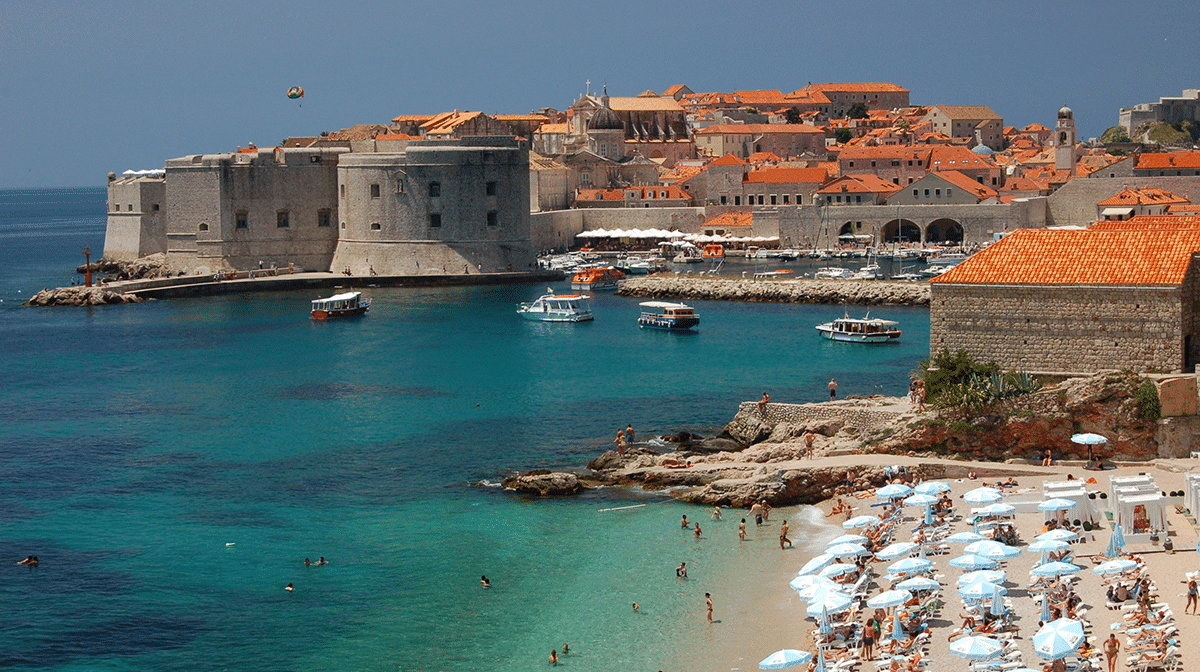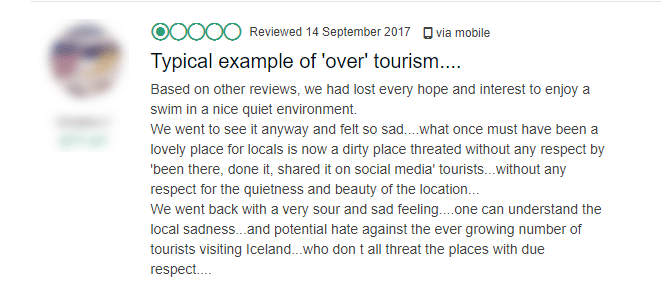Having too many tourists seems like a good problem to have. But ask people in Venice, Santorini, Dubrovnik, and an increasing collection of cities and sites around the globe, and you’ll hear a very different take.
“Around 2,000 people leave each year,” Venetian Carlo Beltrame told The Guardian this summer. “If we go on this way, in a few years’ time Venice will only be populated by tourists. This would be a social, anthropological and historical disaster.”
This July, Beltrame organized a protest that brought together an estimated 2000 locals angry about overtourism. They’re unhappy about issues like increasing housing prices, vacation rentals, a declining local population, shifts in culture, and pollution from cruise ships. This isn’t a new problem in Venice — similar protests happened in 2016, and UNESCO declared the city’s World Heritage status in danger in 2015 — but momentum is building toward a global overtourism crisis.

Photo credit: Felix Montino
In Thailand, thousands of visitors head to Maya Beach every day during high season, and that overcrowding has reportedly led to the deaths of 12 of the area’s 14 coral reefs. In Berlin, anti-tourist sentiment has bubbled over into a mix of resentment over tourist-inspired gentrification and recent influxes of refugees. Santorini’s infrastructure can’t keep up with the demands of becoming a year-round tourism destination. Dubrovnik, the filming location for Game of Thrones‘ King’s Landing, has aggressively capped its tourist numbers in response to overcrowding.
For some locals, the solution is simple: get rid of the tourists, and you get rid of the problem.
A Complex Problem
Anti-tourism sentiment comes from a place of self-preservation, but realistically, getting rid of tourists is never going to be the solution these cities need. Dubrovnik may see too many tourists, but an outsized 18.1 percent of Crotia’s GDP comes from the tourism sector. Without those tourists, the country would suffer. Similarly, 11.1 percent of Italy’s GDP comes from the travel and tourism sector.

That’s why, as the topic of overtourism spreads and governments begin to get involved, the idea of severely restricting or regulating tourism and travel companies rarely comes up. Instead, everyone looks for compromises. In Venice, a plan is underway to have cruise ships take longer, less-harmful routes in and out of the lagoon. Some cities are banning AirBnB, or restricting the number of new accomodations that can open.
WTM London pushed overtourism to the forefront of its agenda as part of its responsible tourism focus. At one summit, Taleb Rifai, UNWTO Secretary General, suggested that the industry should take the protests as a wake-up call. “We cannot continue to build five-star hotels in three-star communities. Jobs and charity are not enough – we need to diversify visitors’ activities, reduce seasonality and raise awareness of less busy destinations.”
If, as critics suggest, we’re approaching a tipping point, more drastic changes may be required to calm an angry populace.
Spreading Resentment
Perhaps the greatest fear about overtourism is that it will shift perception of the entire sector from a welcome economy boost to a nuisance that locals would rather avoid. Take Whistler, Canada, a ski resort town that isn’t yet feeling the full brunt of overtourism. After a couple record years and a push for year-round visitors, residents do have some complaints.

Whistler’s mayor, Nancy Wilhelm-Morden, is extremely supportive of Whistler tourism, but is looking at novel ways to ameliorate the problem. One of those solutions has been to suggest local day-trippers stay away — a suggestion that hasn’t been popular among those locals.
“We want to attract those people who enjoy and appreciate our community culture,” said Wilhelm-Morden in an interview with CBC.
“We don’t necessarily want people who are coming up for a day, packing a bag with their lunch in it, and not really appreciating the mountain culture that we have.”
It may be a practical idea, but as tourist destinations attempt to police who can visit them and when, anti-tourist sentiment grows. Like many destinations, Whistler’s economy is dependent on tourism, and stirring up too much resentment could be risky. But as overtourism becomes a more popular topic worldwide, more discussions like this will undoubtedly arise.
Review sites are showing the warning signs. Negative reviews that might have once been attributed to nothing more than busy days are now painting pictures of tourists and locals at war.

Growing public awareness of overtourism could mean an unusually crowded day at the beach or a rude local could see a destination branded as a new example of the problem.
The Solutions
Overtourism is a systemic problem in many destinations, and a symptom of global problems that won’t be easily solved. During a debate at WTM London, former Thomson Holidays director Martin Brackenbury expressed the issue eloquently.
“The problem of overtourism has become much worse due to the combination of low-cost airlines and low-cost tourist accommodation,” said Brackenbury. “Residents are divided into those involved in tourism, and those not benefiting who suffer the consequences. Many residential blocks are now rented out through peer-to-peer organisations such as Airbnb, but restricting unlicensed accommodation is not a permanent solution, as it only gives the authorities breathing space.”
While there are strategies small providers can implement, most of the change is likely to come in the form of regulation and systemic efforts. Caroline Bremner, head of travel at Euromonitor, pointed out some of those changes at a WTM session.
“In Barcelona the tourist tax, currently used for tourism promotion, will instead be directed towards providing basic services for neighbourhoods most affected by the influx of visitors. Other strategies could include imposing quotas on the number of tourists at key sites, creating new attractions, improving the dispersal of visitors, curbing hotel expansion, controlling short-term rentals, and raising prices such as introducing ticketing at formerly free attractions.”
If you’re fortunate enough to be based in a location that isn’t suffering the impact of overtourism, it may be worth planning for the future. This problem isn’t going away, and its ripples through the industry are only going to grow.
Title Photo Credit: Jim Forest
Search The Blog
Categories
Most Popular Articles
- Set-jetting, Forest Bathing, and Hush Trips: 20 Innovative Tourism Business Ideas and Trends for 2023
- How to Create and Promote Amazing Tour Packages
- Advantages and Disadvantages of Online Travel Agencies (OTAs)
- Your Marketing Mix: the 7 Ps of Travel and Tourism Marketing
- How to Create a Business Plan for Your Tour or Travel Company





